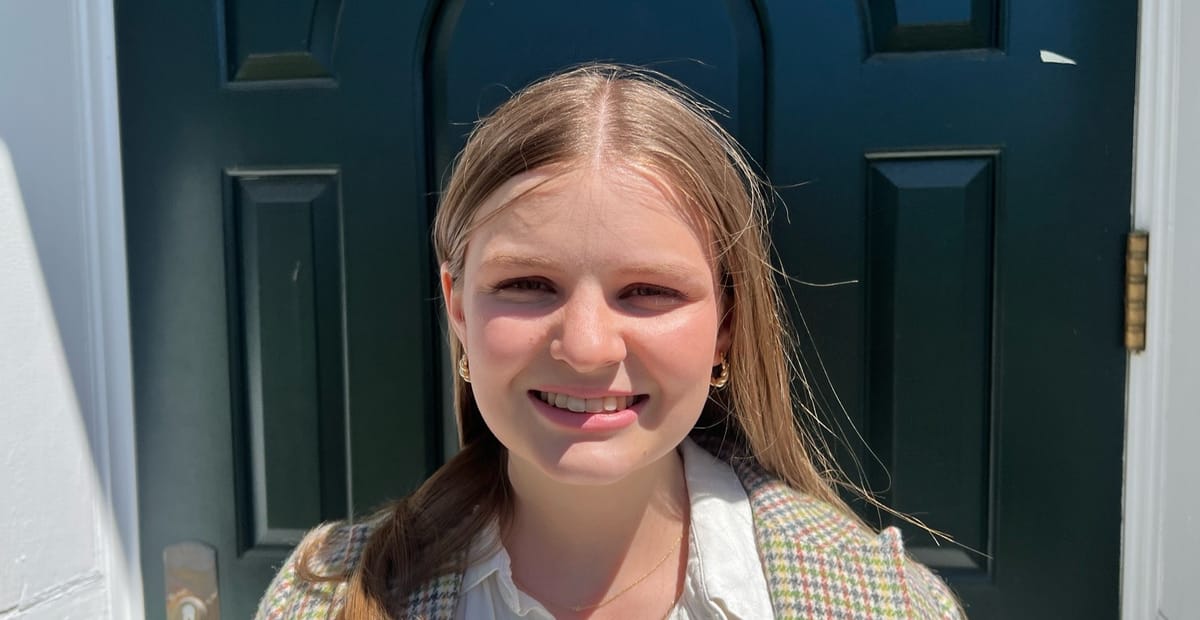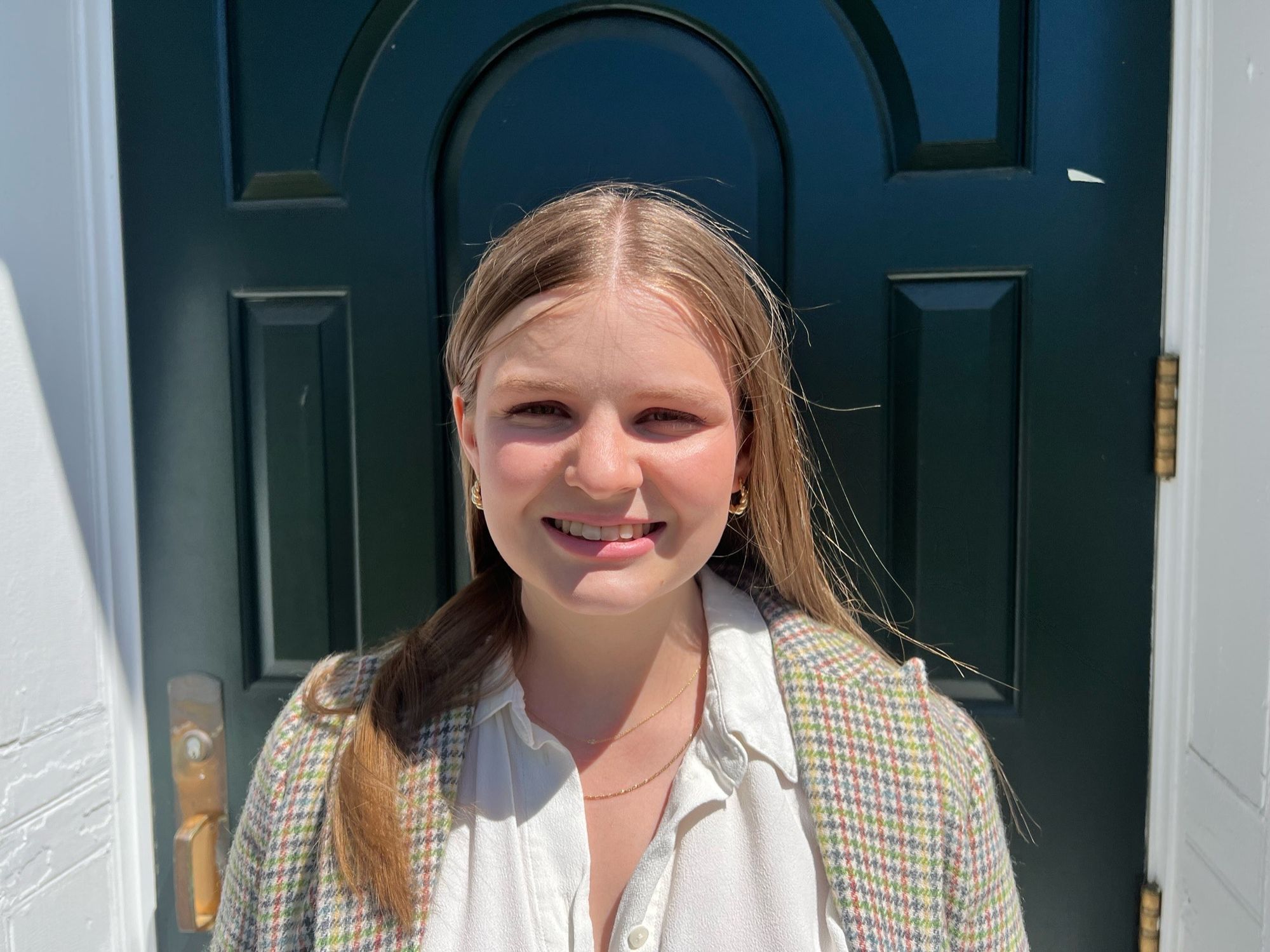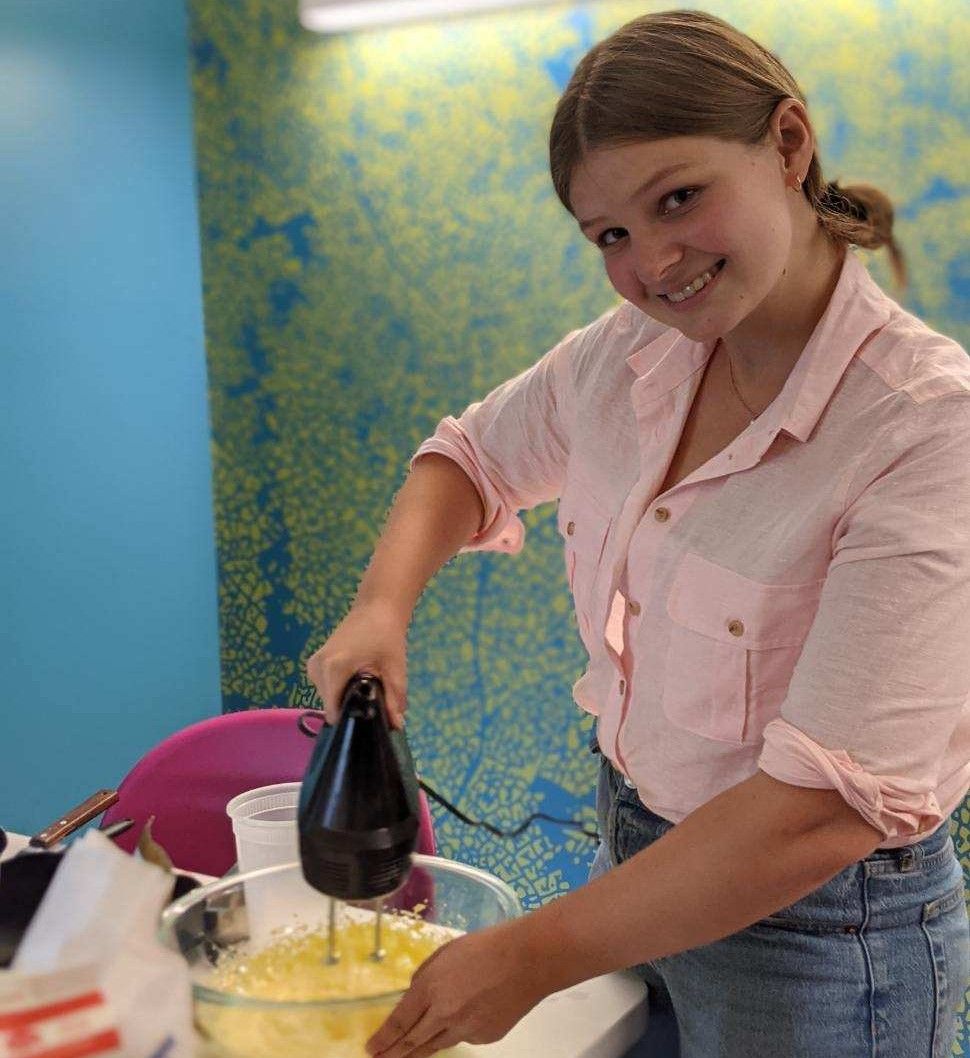Ella Peterson: A Community Builder With a Love for Democracy
Ella Peterson has used her time at Amherst to avidly pursue her interest in the political sphere, effecting positive change and building community along the way.


As I first sat down to chat with Ella Peterson ’22, I was surprised to learn that I didn’t have to introduce myself. I remembered Peterson as my remarkably friendly first-year Orientation Leader, whose positive personality shone through during various rounds of awkward icebreakers over Zoom. The fact that she remembered me from nearly two years ago as a tiny square on a computer screen is deeply emblematic of who Peterson is as a person: someone who sincerely cares about others.
Growing up right outside of Philadelphia in South Jersey, Peterson highly valued being part of a close-knit town. She knew she wanted the same sense of community in college, and fell in love with Amherst after attending Admitted Students Weekend.
It is no surprise, then, that through her four years at Amherst, Peterson has worked tirelessly in the political space and beyond to promote the same feeling of community that drew her to the school in the first place.
A Devotion to Politics and Economics
At Amherst, Peterson double-majored in political science and economics, and completed the Five College Certificate in International Relations.
But her interest in politics shone through even at a young age. In third grade, Peterson answered “Secretary of State” when asked what she wanted to be when she grew up. Although she is no longer sure about that answer, she has always felt drawn to politics for its capacity to effect positive change.
“I just always really cared about trying to make this place better for all of us. And to me, with my theories of change, it seems to me that the way to go about that was with policy,” Peterson said.
Peterson’s economics major appealed to her long-held curiosity about “the world around [her] and how places work and people interact with one another.” She enjoyed taking an economics class in high school, which led her to decide on taking economics as well in college.
Through writing a political science thesis senior year, Peterson brought these two interests together and discovered her “deep-seated love of democracy.” Her thesis compared peace deals in countries that all practiced a form of democracy called consociationalism and experienced ongoing conflicts. “[They were] sometimes able to make progress and sometimes not; [I would] try to theorize the different ways that that happened. That’s all stuff that’s really interesting and important to me,” she said.
Outside the classroom, Peterson explored her passion for politics by joining the Amherst Political Union (APU) her freshman year, becoming co-president during her senior year.
She recalled really enjoying “living out the free speech debate in meetings,” because it resonated with one of her central values: maintaining community through open discourse. She noted that while there was more open discourse her freshman year, there was also less community, which she felt was stronger by her senior year.
Her involvement in the club taught her “a lot about how other people think about how other people process politics, because they think the personal is the political.” She added, “I think that we pretend those lines are separate, but they’re not.”
She felt that the different perspectives within the APU were really valuable. As an example, she cited a meeting during her sophomore year when the club discussed then-President Donald Trump’s policies on China, and Chinese international students came to share their thoughts on the matter. “That was a really different perspective than what you might have seen written in the New York Times,” she said.
Building Community Through Her Work
Peterson’s passion for hearing other perspectives and facilitating community also transferred to her campus jobs as a Community Advisor (CA), a tour guide, and an Orientation Leader.
Peterson loved being a CA because it let her “make more connections with students.” She is known across campus for planning fun and unique activities for her residents, like paint nights, gardening, and scavenger hunts.
One of her fondest memories as a CA was when a resident of her sophomore-year floor knocked on her door and asked Peterson what she should wear to her first formal. In addition to sweet moments like that one, Peterson said there were plenty of rough moments too — she saw people at their best and helped them through their worst.
Peterson feels that being a CA was one of the most meaningful parts of her time at Amherst. “I’ve had such a sense of profound honor and privilege that I get to make people’s experiences on campus a little more comfortable, a little more like home,” she reflected.
However, Peterson also experienced a “really dangerous situation” as a CA on the first-year quad her sophomore year, which her “supervisors kind of continuously ignored until it got to a point where people’s safety were at risk, including [her] own.” Even after trying to get somebody to do something about it, she felt like her concerns were “falling on deaf ears.”
After that experience, Peterson reflected on the number of hours of work she put in, the amount of emotional effort, and the lack of clarity about when she was on-call, in addition to other struggles she and other CAs had experienced working for the Office of Residential Life (ResLife). As a result, the experience of working as a CA took a major toll on her mental health during her sophomore year, despite her love for the job.
“I didn’t want anyone else at this college to have to go through some of the things that I went through,” Peterson said. She pointed out that the majority of CAs are on financial aid, and that there are no structures to support these students who experience difficulties working under ResLife.

Fighting for Change
Instead of letting the issue go, Peterson got involved. She started talking to people in an effort to let the broader community of students working on campus know that they could improve their working conditions. “We have rights as workers,” she said. “Even though a lot of our work doesn’t look like conventional work, it’s still important; it’s still a valuable service to the institution.” As a result, she decided to co-found the Union of Student Workers at Amherst College (USWAC).
“Unionizing became a way to try to create or enshrine protections,” she said. “The way you keep good labor practices is that you have a good union fighting for you. … You cannot trust your employer to be benevolent.” While she says that student workers have not yet gained a union, she hopes students will continue the work of trying.
Organizing is frustrating and taxing, but it is also the work that makes Peterson feel the most alive. “I love fighting for a cause, and I love helping others see that they too can fight for their own dignity and self worth,” she said.
In this same vein, Peterson has been vocal about many issues at Amherst that have come to her attention, such as the college’s distribution of financial aid and its failure to address the root problems of sexual violence on campus.
However, she says her passion for working to make Amherst a better place derives from her deep love of the school. “The reason that I’ve always ended up getting myself into scrapes, saying unfortunate things in The Student or, you know, yelling, or helping organize protests, or whatever it is, is because I truly believe in the mission of this institution, and its capacity to grow and change and be a better place for us all,” she said. “The only way that that happens is to make some noise in the process.”
“I don’t think I’ve ever been in an environment where I was better suited to learn,” Peterson reflected. She says that at Amherst she learned intellectually, about relationships, about who she is, about how the world works: all lessons she will take into the next chapter of her life.
Next Steps
It is no surprise, then, that after devoting her time at Amherst to helping others, Peterson wants to pursue teaching in the long term after spending time in the political sphere. As a teaching assistant for multiple economics classes, particularly Willard Long Thorp Professor of Economics Jessica Reyes’ class on anti-racist economics, she discovered that she found having conversations with students and helping them think about issues to be deeply meaningful.
“I don’t know if I would like specifically to come back here [Amherst]; there’s a lot of contingencies. But I’ve discovered that I really love teaching,” she said.
In the next couple years or so, Peterson will first look for a job in the political space, and then plans to attend graduate school and pursue a Ph.D. in political science.
She also plans to take a break before going to work full-time. “I would really love to be able to spend my days not only thinking and writing about democracy, but also living and breathing it,” she said. “That’s why it’s important to me to take a little bit of time off, do a little bit of living and breathing that democracy, before I retreat to the ivory tower, with one foot in the real world.”





Comments ()